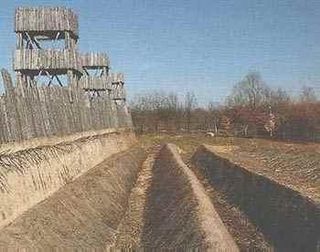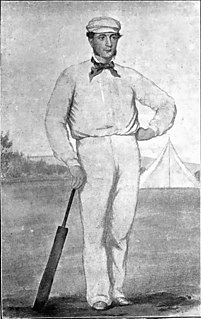Related Research Articles

Gaius Julius Caesar, known by his nomen and cognomen Julius Caesar, was a Roman politician, military general, and historian who played a critical role in the events that led to the demise of the Roman Republic and the rise of the Roman Empire. He also wrote Latin prose.

Around the start of the Common Era, the family trees of the gens Julia and the gens Claudia became intertwined into the Julio-Claudian family tree as a result of marriages and adoptions.

Vercingetorix was a king and chieftain of the Arverni tribe; he united the Gauls in a revolt against Roman forces during the last phase of Julius Caesar's Gallic Wars.

Marcus Junius Brutus, often referred to as Brutus, was a politician of the late Roman Republic. After being adopted by his uncle he used the name Quintus Servilius Caepio Brutus, but eventually returned to using his original name. He took a leading role in the assassination of Julius Caesar.

The Tragedy of Julius Caesar is a history play and tragedy by William Shakespeare, believed to have been written in 1599. It is one of several plays written by Shakespeare based on true events from Roman history, which also include Coriolanus and Antony and Cleopatra.

The gens Julia or Iulia was one of the most ancient patrician families at Ancient Rome. Members of the gens attained the highest dignities of the state in the earliest times of the Republic. The first of the family to obtain the consulship was Gaius Julius Iulus in 489 BC. The gens is perhaps best known, however, for Gaius Julius Caesar, the dictator, and grand uncle of the emperor Augustus, through whom the name was passed to the so-called Julio-Claudian dynasty of the 1st century AD. The nomen Julius became very common in imperial times, as the descendants of persons enrolled as citizens under the early emperors began to make their mark in history.

The Battle of Alesia or Siege of Alesia was a military engagement in the Gallic Wars that took place in September, 52 BC, around the Gallic oppidum of Alesia, a major centre of the Mandubii tribe. It was fought by the army of Julius Caesar against a confederation of Gallic tribes united under the leadership of Vercingetorix of the Arverni. It was the last major engagement between Gauls and Romans, and is considered one of Caesar's greatest military achievements and a classic example of siege warfare and investment. The battle of Alesia marked the end of Gallic independence in France and Belgium.
The Populares were a political faction in the late Roman Republic who favoured the cause of the plebeians.

Julius Caesar was an English cricketer who played in 194 first-class matches between 1849 and 1867.

Et tu, Brute? is a Latin phrase literally meaning "and you, Brutus?" or "also you, Brutus?", often translated as "You as well, Brutus?" or "Even you, Brutus?". It is notable for its occurrence in William Shakespeare's play Julius Caesar, where it is spoken by the Roman dictator Julius Caesar to his friend Marcus Junius Brutus at the moment of Caesar's assassination. The first known occurrences of the phrase are said to be in two earlier Elizabethan plays; Henry VI, Part 3 by Shakespeare, and an even earlier play, Caesar Interfectus, by Richard Eedes. The phrase is often used apart from the plays to signify an unexpected betrayal by a friend.

Gaius Julius Caesar, one of the most influential men in world history, has frequently appeared in literary and artistic works since ancient times.
1859 was the 73rd season of cricket in England since the foundation of Marylebone Cricket Club (MCC). The highlight was one of the sport's most remarkable all-round performances by V. E. Walker.
1856 was the 70th season of cricket in England since the foundation of Marylebone Cricket Club (MCC). Surrey began a run of success with a side that featured William Caffyn, Tom Lockyer, Edgar Willsher, HH Stephenson and Julius Caesar.

The assassination of Caesar was the result of a conspiracy by many Roman senators led by Gaius Cassius Longinus, Decimus Junius Brutus Albinus, and Marcus Junius Brutus. They stabbed Caesar to death in a location adjacent to the Theatre of Pompey on the Ides of March 15 March 44 BC. Caesar was the Dictator of the Roman Republic, having recently been declared dictator perpetuo by the Senate of the Roman Republic. This declaration made many senators fear that Caesar wanted to overthrow the Senate in favor of totalitarianism, as well as the fear that Caesar’s pro plebeian manifesto would endanger them financially. The conspirators were unable to restore the Roman Republic, and the ramifications of the assassination led to the Liberators' civil war and ultimately to the Principate period of the Roman Empire.
An England cricket team toured Australia and New Zealand in the 1863–64 season. This was the second tour of Australia by an English team, the first having been in 1861–62, and the first to visit New Zealand. Like the 1859 team in North America, this team is sometimes referred to as George Parr's XI.
The early career of Julius Caesar was characterized by military adventurism and political persecution. Julius Caesar was born on July 13, 100 BC, into a patrician family, the gens Julia, which claimed descent from Iulus, son of the legendary Trojan prince Aeneas, supposedly the son of the goddess Venus. His father died when he was just 16, leaving Caesar as the head of the household. His family status put him at odds with the Dictator Lucius Cornelius Sulla, who almost had him executed.

Veni, vidi, vici is a Latin phrase popularly attributed to Julius Caesar who, according to Appian, used the phrase in a letter to the Roman Senate around 47 BC after he had achieved a quick victory in his short war against Pharnaces II of Pontus at the Battle of Zela. The phrase is used to refer to a swift, conclusive victory.
J. Paget was an English first-class cricketer who made one appearance in 1851 for Manchester Cricket Club against Sheffield Cricket Club at the Hyde Park Ground in Sheffield. Opening the batting alongside Julius Caesar in Lancashire's first innings, Paget scored 2 runs before he was dismissed by Richard Skelton. Paget batted in the lower-order in Lancashire's second innings, scoring 13 runs before he was dismissed by Henry Wright. Yorkshire won the match by 6 wickets.
Frederick Bowles Caesar was an English first-class cricketer active 1859–62 who played for Surrey. A brother of Julius Caesar, he was born in Godalming and died in Bermondsey. He played in eight first-class matches.
References
- ↑ CricketArchive. Retrieved on 7 August 2009.
| This biographical article related to an English cricket person born in the 1790s is a stub. You can help Wikipedia by expanding it. |